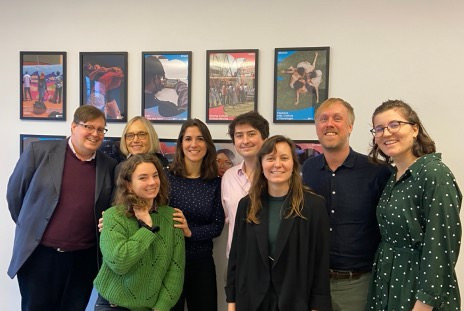
EUNIC Cluster Fund 2023: Selection results
19 cultural relations projects have been selected for co-funding in this year's edition of the EUNIC Cluster Fund for a total of 330.700€. The 2023 call strongly welcomed proposals which address the climate crisis through cultural activities and combine culture with climate action in meaningful ways.

The Cluster Fund is EUNIC’s primary instrument to financially support colleagues working in EUNIC clusters around the globe in delivering cultural relations activities. It was initiated in 2012 and has up to today financed over 200 cultural relations projects worldwide.
The purpose of this call is to co-finance cluster projects that:
- Contribute to the principles of international cultural relations and to the implementation of the EUNIC Strategic Framework of 2020-2024;
- Strengthen cooperation amongst EUNIC cluster members and partners on the ground;
- Deliver the local cluster strategies;
- Raise the profile of EUNIC through improved quality of EUNIC cluster projects.
The 2023 call
Building on EUNIC’s ongoing committment to the UN’s 2030 Agenda for Sustainable Development and the Sustainable Development Goals, the EUNIC General Assembly identified climate action as one of EUNIC’s priority topics in June 2022. This led within others to the EUNIC Climate Cultures Creative Lab, a shared project on this topic implemented from March to June 2023. In continuation of these engagements, the Cluster Fund 2023 strongly welcomed project proposals that address the climate crisis directly through their cultural activities and combine culture with climate action.
For this year's call, 47 applications were submitted. The 19 selected projects involve 20 clusters (7 projects from the EU and wider Europe and 12 outside of Europe), 33 EUNIC members, 15 EU Delegations or European Commission Representations, and over 100 local partners with a total budget of more than 780,000 euros including the co-financing by members of EUNIC clusters and local partners. Projects will be implemented in the course of 2024.
For an application, at least three EUNIC members need to collaborate on a joint proposal and involve relevant local partners. A 40% co-financing rate applies. The call had eight selection criteria: relevance to local context, alignment with cultural relations’ principles, collaboration of EUNIC members, partnerships, impact and evaluation, feasibility, visibility and sustainability. The overall quality of submitted proposals was high.
Four colleagues representing EUNIC members took part in the evaluation process, guided by the EUNIC office:
- Tatjana Langášková, Czech Centres HQ, Coordinator programme department, former president of EUNIC Warsaw;
- Marie Lesage, Institut français HQ, Head of European projects, participant of the EUNIC Climate Culture(s) Creative Lab Berlin;
- Thom Louis, British Council Edinburgh, Senior Operations Manager, Chief Executive Office;
- Simon Mraz, Austrian Federal Ministry for European and International Affairs HQ, Project Coordinator at the Directorate General for International Cultural Relations, former president of EUNIC Moscow.
Selected projects
The 19 selected projects are from the following clusters:
- Algeria
- Ankara
- Bosnia and Herzegovina
- Bulgaria
- Colombia
- Hong Kong
- Indonesia
- Kenya
- Latvia
- Mongolia
- New Delhi
- New York
- Peru
- Romania
- Saudi Arabia
- Serbia
- Sri Lanka
- Sweden
- Thailand
Find out more about the selected projects here.
